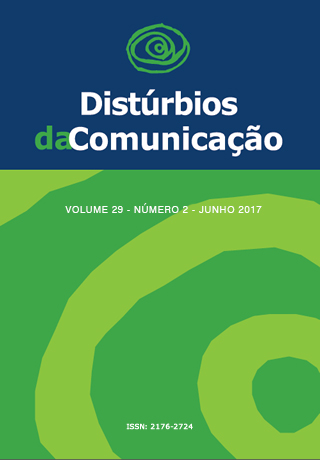Voice and swallowing effects after expiratory muscle strength training program in Parkinson’s Disease
DOI:
https://doi.org/10.23925/2176-2724.2017v29i2p274-283Keywords:
Parkinson Disease, Voice, Respiration, SwallowingAbstract
The goal of this research is to evaluate the effects of an expiratory muscle training program on voice and swallowing. Parkinson´s disease is a neurodegenerative condition with impacts on voice and swallowing. Muscle rigidity, which is common in Parkinson´s disease, is global and affects the respiratory muscles, causing respiratory disorders and voice and swallowing difficulties. Six participants diagnosed with Parkinson´s disease participated in this study. They were submitted to an eight-week therapeutic intervention focusing on expiratory muscle training. The therapeutic sessions occurred weekly at the institution and the participants were encouraged to perform the proposed exercises at home twice a week. The self-perception of swallowing problems was collected before and after intervention and voice analysis, as well as the respiratory parameters, were collected before, in the fourth week and at the end of the training program. In general, the results showed improvement in respiratory parameters. The voice parameters did not present significant differences after training. The self-perception of swallowing problems changed after training as some complaints disappeared and the participants reported new ones. The findings may have been influenced by time of disease and individual characteristics of each participant. During the training program, the participants presented improvements in exercise performance, which suggests a motor learning. The effects of expiratory muscle exercises may be greater if combined with other therapeutic interventions.Downloads
Metrics
Downloads
Published
How to Cite
Issue
Section
License
Copyright (c) 2017 Thamara Munhoz Ferraz de Camargo Sarpi, Mayara Fieri, Carla Sales Chamouton, Ana Carolina Constantini

This work is licensed under a Creative Commons Attribution 4.0 International License.






